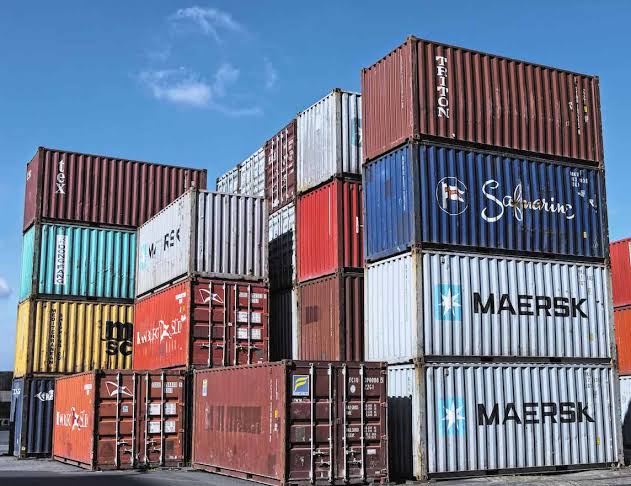
According to the National Inland Waterways Authority (NIWA), more than 65 percent of commercial cargoes berthing at Nigerian ports end up in the country’s Southeast, primarily in Onitsha, Anambra State, and Aba, Abia State.
The Managing Director of NIWA, Dr George Moghalu, disclosed this on Thursday while speaking at weekly Ministerial Briefing, organised by the Presidential Communication Team, at the Presidential Villa, Abuja.
He also stated that the federal government is negotiating an agreement with South Africa to secure technology for monitoring and securing the nation’s inland waterways.
He also revealed that everything is now in place for cargo movement in Onitsha River Port, despite the fact that the owner of the cargo will determine the movement.
While providing updates on the agency’s activities, Moghalu noted that the current road network infrastructure cannot handle the sheer volume of traffic required to transport cargo from the southeast to the rest of the country.
He explained that this necessitated NIWA’s recent efforts to provide water inroads to the country’s north.
According to the NIWA boss, water transportation would help to reduce the weight of the heavy duty traffic on the roads and also generate revenue for the country.
Moghalu also expressed concern about the dangers of floating debris in vital waterways.
He claimed that the authority spends a fortune each year to remove non-biodegradable wastes such as plastic and rubber from the waterways.
He also said that work has commenced at the Oguta River Port which he said was abandoned for 13 years, adding that perimeter fence has been erected at the place and the port now segmented.
Speaking about the acquisition of technology to secure the country’s inland waterways, Moghalu stated that with the technology, the authority can monitor the movement of vessels anywhere in the waterways.
He said the South African firm whose name he did not reveal, exchanged visits with NIWA and the authority informed them of the challenges faced in their effort to provide security in Nigeria’s waterways.
According to him, the company affirmed that they could help because of the type of technology available, which is currently being deployed in South Africa.
“We visited them and they visited us and we now presented our challenge because we want to be in a position to monitor all our waterways and they have the technology.”
“There is a technology they are going to deploy so that I will be in the control room in Lokoja and be able to monitor all the vessels that operate in our waterways,” he said.
He revealed that despite talks of insecurity, survey has commenced on Lake Chad to open it up as an inland water transportation hub to access other African countries.
According to him, the fact that the survey is ongoing is an indication that insecurity prevailing in the region has been sufficiently addressed.
Asked how NIWA plans to be self-suataining, Moghalu said “we are doing quite a lot. Like I did say our revenue profile, which I can make available to you, shows a gradual increase from what it used to be to what it is now. We has not come down even during the COVID period. We still managed to maintain an upward trajectory and we intend to sustain that. And don’t forget, like for example now, we have concessioned Onitsha River Port, our revenue from that source will increase.
“By the time we concession Baro, by the time we conclude with to Ogutta, we wconclude with Lokoja, and by the time we increase the use of the waterways because, as we are opening up the channel, the needs will increase. Like I said, by the time we move cargos regularly, the way we want to move between Ontisha and Lagos, the truth is that over 60 to 65% of containerized cargo that arrive Lagos today and Onitsha and Aba.
“These cargoes, let us take a hypothesis, let’s say is 5 million containers that arrive and is destined for Southeast. What that translates to is 10 million trailers been on our roads. Five million carrying the container down, five million carrying the containers back. And our roads are not designed to carry those pressures. There’s no way our infrastructure will survive it.
“So by the time we remove this pressure from our roads, and move into the waterway, it is additional revenue for us, because those containers will now be moved by water and by the time they move by water, certainly, we’re going to get more money. So we are concerned about it. We are working towards it. And that’s what we’re laying so much emphasis on it.
“Like I said, the day I was appointed MD, my first press statement, in fact that exact day and don’t forget it 8th of October 2019. I said that I would have seen myself having succeeded if by the time I leave office, water transportation becomes the transport means of choice for both economic, goods and persons. That is where my eyes are and by the grace of God who realize it”, he explained.
Moghalu also lamented the menace of floating debris in vital waterways.
He said the authority spends a fortune annually to rid the waterways of nonbiodegradable wastes such as plastic and rubber.
He also said that work has commenced at the Oguta River Port which he said was abandoned for 13 years, adding that perimeter fence has been erected at the place and the port now segmented.
He revealed that despite talks of insecurity, survey has commenced on Lake Chad to open it up as an inland water transportation hub to access other African countries.
According to him, the fact that the survey is ongoing is an indication that insecurity prevailing in the region has been sufficiently addressed.